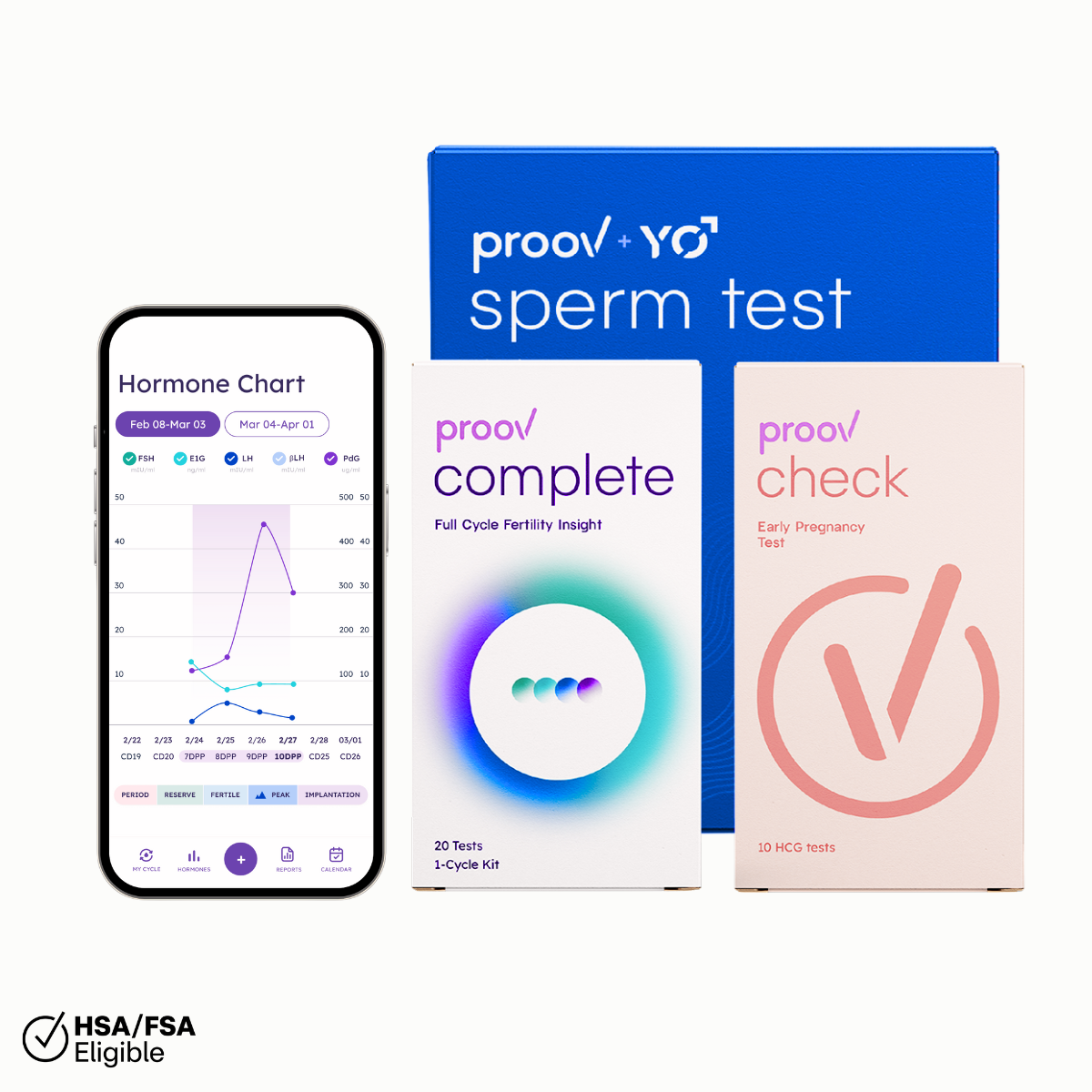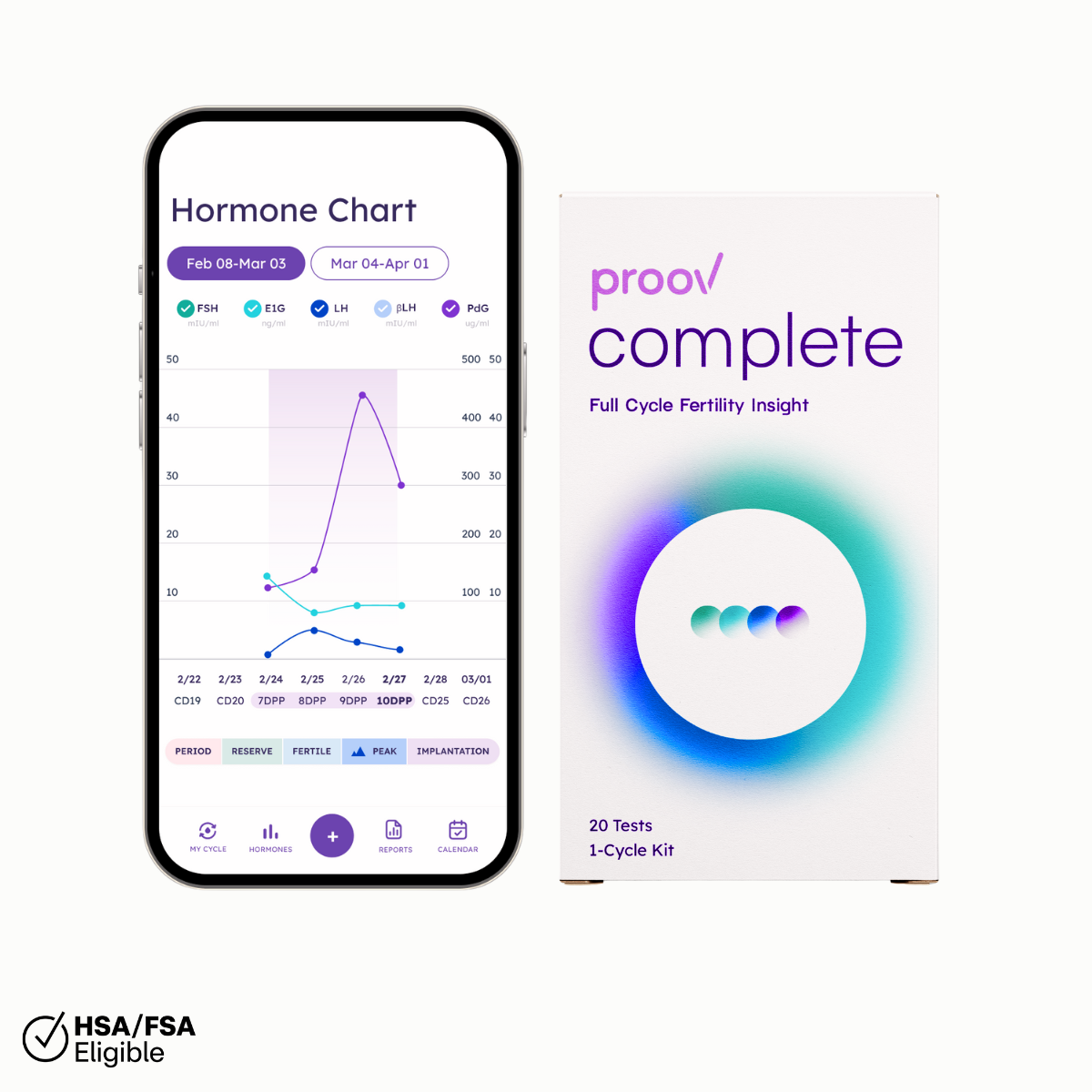If you’ve been anywhere around the internet lately, you’ve probably heard of at least some hormone tests, but it’s easy to be overwhelmed by all the options! Especially if you’re trying to conceive, testing your hormones can be a great tool, but how do you know what tests to pick?
Proov is here to help – we developed Proov Confirm, the first FDA-cleared at-home test for PdG (a metabolite of progesterone), to test for successful ovulation and give you some crucial starting points for your fertility journey. And we have a number of other useful tests, too: today we’ll talk about the difference between Predict and Confirm.
Hormone Testing 101: What to Know
When you’re getting started with hormone testing kits, there are a few things you should know. First, not all hormone tests are checking the same things. There are four main menstrual cycle hormones, and there are tests that will test one, two, or even four of them at once. There are also other hormones like AMH (anti-mullerian hormone) and thyroid-stimulating hormone that are relevant to fertility.
So based on your needs, you’ll want to choose your tests accordingly. If you’re more interested in future fertility, something like Proov Reserve FSH (follicle stimulating hormone) tests will help you understand your ovarian reserve. Or, if you want a one-stop shop to confirm successful ovulation, track your entire cycle, and test your partner’s sperm, you may want to check out the Hers & His test kit.
Another thing to consider is if you want to test with blood or urine, and if you want to test at-home or in a clinic. In general, blood tests will require you to go into a clinic, although there are still some at-home blood tests. Urinary hormone testing can be carried out at home, and also makes it easier to test throughout your entire cycle, instead of just getting a single time point with a blood draw!
When to Use At-Home Hormone Tests

Ultimately, you can use at-home hormone tests whenever you want to know more about your current or future fertility, but there are definitely some times that we recommend testing. If you’re 35 or older, and trying to conceive, testing sooner rather than later will help you get the lay of the land when time is of the essence (even if you’ve had a baby before).
It can also be helpful to test if you’ve been trying for a few months with no success, to make sure that you’re timing intercourse correctly and that you’re ovulating successfully. Ovulatory disorders are the leading cause of female factor infertility, so they’re probably more common than you think!
Finally, if you already know you have irregular cycles or a condition such as PCOS, testing can help you figure out if and when you’re ovulating, and help you conceive even when things aren’t consistent.
What is Proov’s Predict Hormone test?
Proov Predict is a great place to start, especially if you’ve never done any hormone testing before or are trying to learn when to time intercourse to conceive. Predict tests for luteinizing hormone (LH), which is the hormone that surges 12-36 hours before you ovulate.
When LH surges, since you know ovulation is likely to occur in the next two days, your fertility is as high as it’s going to get that cycle! These are your two most fertile days, when your chance of pregnancy is highest. With Proov Predict, you can test at home, multiple times a day if you want, during the follicular phase of your cycle.
The free Proov Insight app will guide your testing and help you read your results. Even if you’re already using an app to try and predict fertility, adding in hormone testing will help you figure out when you’re actually ovulating and increase your chances of pregnancy.

What is Proov’s Confirm hormone marker test?
Proov Confirm is the test that started it all – the first at-home, FDA-cleared test for successful ovulation! While Predict tests LH, to see when you’re about to ovulate, Confirm tests a hormone that comes later in the cycle, PdG (technically, PdG is a hormone marker of the hormone progesterone) to see if you did ovulate, and if it was successful!
While it’s very likely that you’ll ovulate soon after a positive LH test, there are cases where you might not, including some conditions like PCOS, times of high stress, or sometimes just a random anovulatory cycle (which is more common than you might think). PdG won’t rise until after ovulation, though, so testing PdG will confirm that you ovulated and pregnancy is possible.
Confirm also tests for successful ovulation, which is a reflection of if your PdG levels are high enough for a newly fertilized egg to actually implant in the uterine lining. Basically, progesterone is the hormone that makes the uterus “sticky” to support implantation, and if your progesterone levels are high enough, implantation becomes much more likely.
With Proov Confirm, you can make sure that you’re ovulating successfully, or if you determine you aren’t, get guidance and next steps to balance your hormones and support successful implantation.
Why to Use the Two Tests Together: An Overview of Benefits
You might see now that Predict and Confirm are a perfect pair, with one telling you when to try and one confirming that ovulation occurred after all. With Predict during the fertile window and Confirm during the implantation window, you’ll be covered during the most important parts of your cycle.

It’s important to note that about 10% of women won’t get a positive LH test, so if you never get a positive, it’s possible that you’re still ovulating (if that’s you, check out this article to learn more). Additionally, if you have PCOS, you may have many positive LH tests due to your baseline LH being higher than usual. Both of these are reasons that it’s also important to confirm successful ovulation, not just predict it, and why using Confirm can be a big help in your TTC journey.
Especially if you’ve been trying for a little while, adding Confirm into your testing routine will provide important information about whether or not pregnancy is even possible each cycle. So now that you know all about two of our most popular at home hormone tests, which are you going to try first? Check out Predict & Confirm here!












